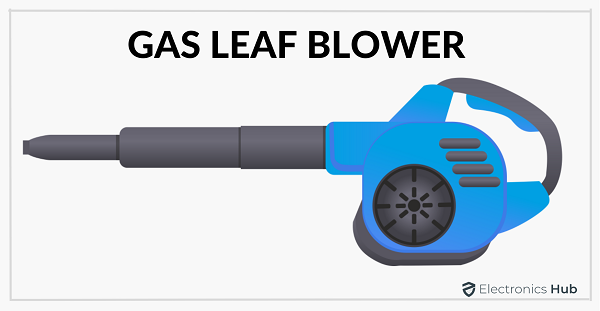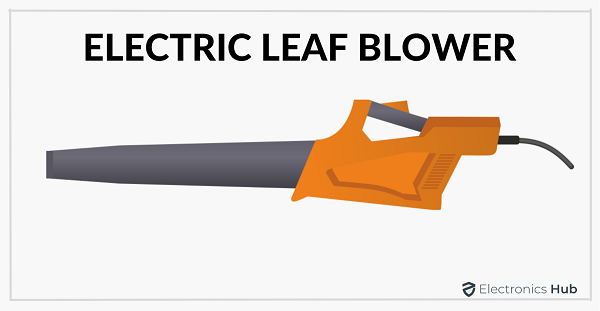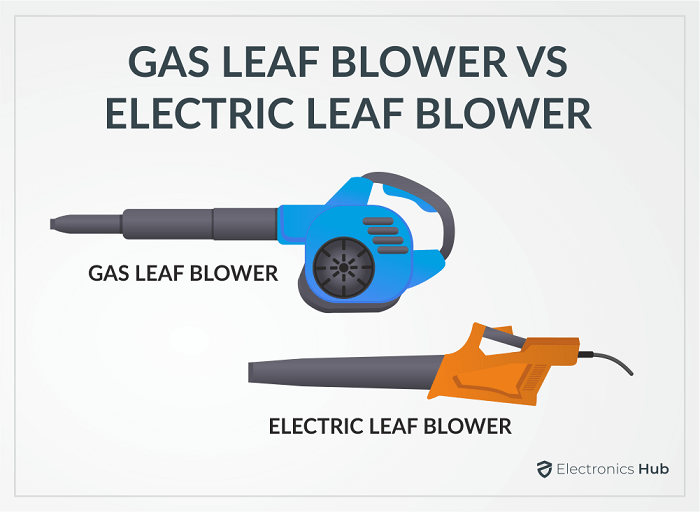But while purchasing a leaf blower – one of the common dilemmas faced is – whether to choose an electric or gas model. Both gas and electric leaf blower are powerful machines and choosing the best one among them depends mainly on the user requirements. If you are wondering how to analyse the right option among these two options, then the below article is quite helpful. Here, we have provided an in-depth comparison between them to help you make an informed decision while making the purchase. Before going into the comparison analysis, let’s first understand what electric leaf blower and gas leaf blower are.
Overview of Gas Leaf Blower
Gas blowers are the best way to clear a parking area of excessive leaf litter. These provide the best power and can last for the entire day. This is crucial when dealing with commercial-sized properties. Gas blowers are quick and efficient. However, gas leaf blowers have their limitations. Gas leaf blowers are heavier than the electric models. Additionally, they require fuel maintenance. Gas blowers can also make a lot noise which could be a problem for neighbours’ homes. In many cases, a gas blower may limit your ability to clean at certain hours. Companies may also face city regulations that prohibit the use of gas-powered blowers. Many cities in the Bay Area have banned gas blowers because of noise and environmental concerns.
Overview of Electric Leaf Blower
Electric leaf blowers offer a great alternative for gas blowers. Because they emit no pollutants, they are environmentally friendly. An electric blower is quiet, which makes it ideal for commercial spaces that must adhere to city regulations. Battery life is the main problem with an electric blower. An electric blower’s battery life is typically between 30-40 minutes before it needs to be recharged or replaced. This is an issue for large properties and cleaning during heavy leaf fall season. While they are less expensive than a gas blower but require more batteries to clean large properties, this can quickly add up. The maintenance time is cut short by the time it takes to recharge or change batteries. An electric leaf blower may be the best, and perhaps the only, option in certain cases.
Quick Comparison – Electric Vs Gas Leaf Blower
Below is a quick comparison of both these power tools. It is helpful for people who want to know only the highlights.
In-depth Comparison of Electric and Gas Leaf Blower
Here, we have provided a brief analysis of both power tools based on their particular features. Read the information thoroughly to make an informed decision.
1. Power
The power source is the first thing that distinguishes an electric leaf blower from a gas leaf blower. This is an important factor in understanding how the blower works to meet your needs. It also has an impact on key aspects of the leaf blower, such as noise level, power output, and manoeuvrability. Gas blowers are the power winners, and that’s a good thing. Because they are more powerful than electric leaf blowers, this is why. The power of cordless leaf blowers is limited. Cordless leaf blowers are more powerful than corded counterparts. Their power is not limited by the outlet’s power rating.
2. Level Blowing field
Before we go into the differences, it is important to remember that electric and gas leaf blowers perform almost identically. This holds true for standard handheld models that are suitable for most homeowners. Gas is the only choice for those who need the power and control of a backpack blower. Today’s leaf blowers offer a vacuum and Mulch functions in addition to blowing. This is available on both electric and gas models but only on handheld versions.
3. Easy Movement
It’s not necessary to spoil the ending but gas blowers are known for their manoeuvrability. This can be a huge advantage depending on how big your yard is and how many trees are needed. An extension cord is required to keep electric blowers in range. This limits your reach to 100 feet from the nearest electrical outlet. Although there are cordless leaf blowers available, they don’t have the power to clean driveways or hard surfaces.
4. Weight
In this instance, electric leaf blowers are the best. The corded models are up to 4.8 pounds. This model is lighter than the cordless. Gas leaf blowers weigh twice as much as electric leaf blowers. However, backpack leaf blowers are still considered lighter models. Noting that heavy gas blowers can weigh around 14 pounds, it is important to keep in mind. Like other products on the market, some backpack models that use gas are heavier than others. These models offer a significant benefit to users as they put weight on the user’s back. This improves manoeuvrability. Although electric leaf blowers may be lighter than traditional leaf blowers, they can still be used with limited mobility. You will need to weigh your yard and the amount of leaves you need to clean. These two factors will determine how long it takes to use the leaf blower.
5. Regular Maintenance
Gas blowers are capable of performing the most basic maintenance tasks, such as filling up and buying new gas. You will also need to mix oil with the gas for 2-cycle engines. The spark plug must also be changed on 4-cycle engines. There may be some seasonal maintenance requirements (for storage outside of the season). These are not required for electric blowers.
6. Noise
Leaf blowers, especially gas blowers are generally noisy. Numerous regions have established regulations that prohibit the use of noisy models. They are also restricted in some countries. A homeowner cannot use leaf blowers only during the day. Electric leaf blowers are quieter than gas models. They are not subject to any restrictions. There are some exceptions. There are some gas models that emit noises up to 67 decibels. This is comparable to two people having a conversation. These gas models can be expensive. Important to remember that these blowers have sound ratings at 60 feet away from leaf blowers. Users will experience a higher level of noise, especially if the blower has a backup motor. Hearing loss can result from leaf blowers with over 80 decibels. A hearing protector is recommended for homeowners.
7. Environmental Impact
Some people prefer the power and convenience of a gas-powered blower to the environmental benefits of an electric one. A gas blower can be expensive to refuel and requires maintenance.
8. Price
No contest. The price of an electric model starts at $30, while a gas model costs around $80. If you don’t have one, an extension cord will be required to power your electric. You should also make sure that the cord is rated for the leaf blower’s amperage draw. A lot of cords that are too short often provide insufficient juice at 100 feet. It can also make it difficult to power electric motors.
Summary – Electric Vs Gas Leaf Blower
As we have mentioned earlier, choosing between electric and gas blower depends on your requirements entirely. Here is a quick summary of our recommendation based on the analysis.
For Smaller Yards
An electric leaf blower is recommended for those who have small or medium-sized yards. To clear small yards of leaves, you don’t usually need the same power as a larger, gas-powered leaf blower. The reach of a corded leaf blower might be sufficient to reach large areas without sacrificing power. Even so, a battery-powered machine can probably handle plenty of smaller yards.
For Large Yards
You may need to buy a gas leaf blower if your yard is large. A corded electric leaf blower will not reach every corner of your yard unless there are a lot of extension cords. You may not be able complete your entire yard with one battery-powered machine. They can only last so long before they have to be recharged. In these instances, a smaller, more powerful gas-powered leaf blower would be the best choice.
For Year-Around Maintenance
We recommend either a gas-powered or battery-powered leaf blower for those who plan to use it for more than leaves. This will depend on how often you plan to use the leaf blower. You will need to recharge your battery-powered options so that you can complete the entire project. A battery-powered model can be a good option if you are able to complete your yard work in a short time. You will need a gas-powered model if you plan to spend hours working with your leaf blower.
For Professionals
Professionals will likely require a gas-powered leaf blower. It is impossible to be sure that an outlet will be available wherever you are going. It is not always a good idea to stop charging your leaf blower’s battery. A gas-powered model is better.
Wrapping Up
If you have a large yard or lawn, investing a leaf blower is very important – as the fall comes it become hard to rake the leaves without a power tool. But the main question now becomes which one to invest in – electric or gas leaf blower. Even though both electric and gas leaf blower serves the same purpose, it all depends according to your requirements. When you choose the right leaf blower, you can make the maximum out of the tool. For small yards, an electric leaf blower will serve the purpose. You don’t have to worry about noise and you can have an easy reach to the power source. When it comes to large yards, you will have to go for a gas leaf blower. In doing so, you don’t have to worry about using extension cords and you can move freely. In case, if you are looking to have a leaf blower for all-year maintenance, you can choose either from a gas-powered or a battery-powered unit. When you happen to use the leaf blower for extended periods, your ideal consideration would be a gas-powered model. If there is no issue regarding power, you can look for a cordless unit and recharge it conveniently. Hopefully, this article has shed some light on which product is right for you. If you still have any doubts, write to us in the comment section below. Comment * Name * Email * Website
Δ








![]()